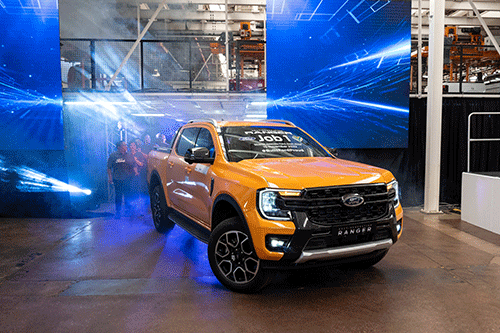Ford Motor Company’s Silverton Assembly Plant in Pretoria, has become the third plant to commence production of the Next-Generation Ranger for customers around the world. The start of the Next-Gen Ranger production follows a major investment of US$1.05 billion (N$15.8 billion) in Ford’s South African operations and supplier tooling.
South African-built Rangers are exported to more than 100 markets, including Europe. Ford Motor Company now has three production hubs in the International Markets Group (IMG) region producing Next-Gen Rangers for global markets, including the Silverton plant in South Africa, and two plants in Thailand. The company also has CKD operations in Vietnam and Cambodia to assemble the Next-Gen Ranger, with plants in the US and Argentina to begin production in 2023.
“The start of Next-Gen Ranger production in South Africa highlights our commitment to delivering must-have products for our customers, not just in South Africa but around the world,” said Dianne Craig, president of Ford International Markets Group (IMG).
“South Africa is an important part of our global Ranger manufacturing network, and it is fantastic to witness the US$1.05 billion investment being utilised to modernise and transform the Silverton Assembly Plant to produce vehicles of the absolute best quality for customers around the world.”
The expanded operations in South Africa contribute to job creation and economic development, with 1 200 new jobs added for a third shift to support the increased production volumes. This takes the workforce at Ford South Africa to 5 500 employees. Ford’s supplier network benefits too, with approximately 10 000 jobs added across the value chain.
Of the total investment of US$1.05 billion, approximately US$686 million (N$10.3 billion) has gone into the transformation and modernisation of the Silverton plant with the construction of its first on-site Stamping Plant, a new highly automated Body Shop, and the introduction of the latest vehicle assembly operations on the Trim, Chassis and Final line.
Furthermore, the only Ford-owned and operated Frame Line in the world was built in the new Tshwane Automotive Special Economic Zone (TASEZ) supplier park adjacent to the Silverton Assembly Plant. Ford’s investment in tooling at its major supplier companies totalled US$365 million (N$5.5 billion).
In addition to the Silverton investment, Ford injected US$34 million (N$600 million) into its Struandale Engine Plant in Gqeberha (formerly Port Elizabeth), which produces all the engines used in the Next-Gen Ranger for South Africa, and more than 100 export markets.
The investment in Struandale Engine Plant has helped Ford introduce the new 3.0L V6 Diesel engine program, comprising cylinder head machining and engine assembly. Upgrades for the Next-Gen Ranger were also implemented on the existing assembly line for the 2.0L Single Turbo and 2.0L B-Turbo diesel engines.
“We have put immense effort, resources, and the latest technologies in place to ensure that the Next-Gen Ranger is truly world-class, and that the Silverton plant globally equals the very best,” said Andrea Cavallaro, Director Operations, Ford IMG.
“We took several strategic decisions including the decision to bring the stamping operations and the frame manufacturing in-house, to ensure complete control of the production quality. The process put in today guarantees that the components going onto the assembly line for every Next-Gen Ranger are of the highest quality.”
The ambitious targets and great confidence for the Next-Gen Ranger are built on a solid foundation established by the outgoing production model. After all, Ford redefined the pick-up segment with the current Ranger.
First launched in 2011, the nameplate remained one of the leading contenders over the ensuing 11 years, earning a long list of accolades in the process.
“The success of the Ranger globally establishes it as one of Ford’s most important nameplates sold in every continent,” said Neale Hill, President, Ford Motor Company Africa. “The Next-Gen Ranger is sure to raise the bar yet again and with the start of production in the Silverton assembly plant”.
A total of 873 751 Rangers were produced at the Silverton Assembly Plant in South Africa. Out of these, nearly 603 000 units were exported to more than 100 global markets, which consistently placed it as the top light commercial vehicle export from South Africa.
South Africa Silverton Plant has also been producing the Everest seven-seater sport utility vehicle (SUV) since 2016. However, with the Silverton Assembly Plant focusing on expanded production for Next-Gen Ranger, the Next-Gen Everest and Next-Gen Ranger Raptor will be sourced from Thailand.
“We are confident that the Next-Gen Ranger will build on this great success story and forge an even more powerful legacy in the years to come,” Hill added.


